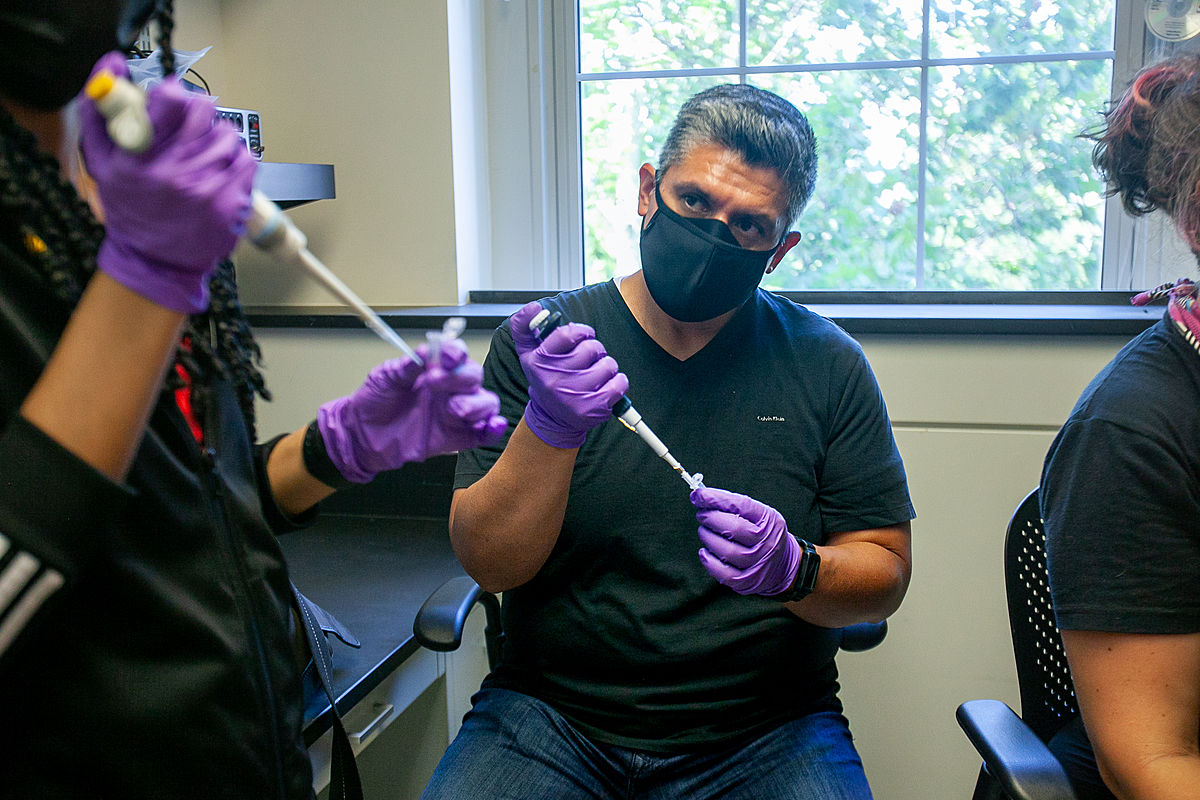At 49 years old, Luis Morales, Jr. was a little hesitant to switch careers. The father of two, who lives in the Scottsdale neighborhood on Chicago’s Southwest Side, had been teaching middle school math and science in the city for nearly a decade but always dreamed of going back to school and becoming a scientist or an engineer himself. When the COVID-19 pandemic hit, Morales reevaluated his priorities and decided to take the leap.
“The pandemic kind of triggered my desire to go back and do what I always wanted to do,” Morales said.
Morales had enrolled in calculus and physics courses at Malcolm X College when he learned about the non-credit introduction to molecular engineering course created specifically for City Colleges of Chicago students led by UChicago’s Pritzker School of Molecular Engineering (PME). The course, designed to open pathways for more City Colleges students to transfer into four-year STEM degree programs, has been part of PME’s mission since 2019, when the University’s molecular engineering program received a $100 million commitment from the Pritzker Foundation and was elevated from an institute to a school. Students receive a $1,500 stipend for their participation.
The course is part of a broader PME goal to help diversify the science and engineering fields. According to the National Science Foundation, in 2018, underrepresented minority students received only 24% of all bachelor’s degrees awarded in science and engineering to U.S. citizens and permanent residents, 22.1% of science and engineering master’s degrees, and 13.6% of all science and engineering doctoral degrees.
Each of the molecular engineering course’s three weeks focuses on a different area of molecular engineering, including quantum engineering and computing, material science and engineering, and immunoengineering — a format Morales says has inspired him to keep an open mind when it comes to his career path. Morales had never even heard of molecular engineering before taking part in the course and says he found the concepts fascinating and their applications, such as creating vaccines or new sources of energy storage, admirable. “No matter what field of science it is, making people’s lives better is always the goal,” he says.

The experience also introduced Morales and his classmates to specific lab skills necessary for many four-year programs, as well as faculty and graduate students who can provide mentoring and professional advice. Conversations with one instructor in particular presented the possibility of Morales working toward a career studying related science in academia after he completes the multi-year electrical engineering program he’s planning to take on next at the University of Illinois at Chicago. “It’s definitely broadening my options and my knowledge of what fields in science I could be in,” he says. “I learned I can still be on the path that I already planned but also, after I’ve done that, I can gear my original plan toward what I’m learning now.”
Though the previous cohort participated in the course remotely, Morales’ class was on UChicago’s campus, taking part in daily morning lectures and afternoon labs. Assistant Professor Hannes Bernien, for instance, showed participating students a cloud of 10 million atoms laser cooled down to a temperature of just a few microkelvin on a lab tour to give them a sense of what quantum experiments look like up close. Seeing theoretical concepts in action seemed to make a big impact, Bernien says, and at least one student followed up with him after the tour for advice on how to navigate a career path in the emerging field.
“The students were so engaged and motivated. They had great questions about our setups and what it’s like to work as quantum scientists,” Bernien says. “Quantum science and technology is a very interdisciplinary field and needs people from many different backgrounds to participate. The program gave the students an opportunity to think about career paths that they might not have considered or might not have even known existed for them.”
Morales, whose own children are college-aged, was older than most of his fellow students but says he felt connected to the diverse group through a shared love of science and the shared experience of being community college students taking part in a UChicago course.
“Coming from a community college, it almost seems unreachable to go to a university like UChicago,” he says. “But that’s the reason why this program exists, because they want to help us believe that we can make it reachable.”



